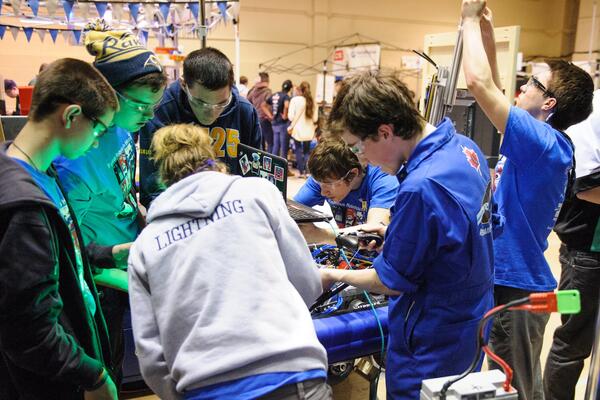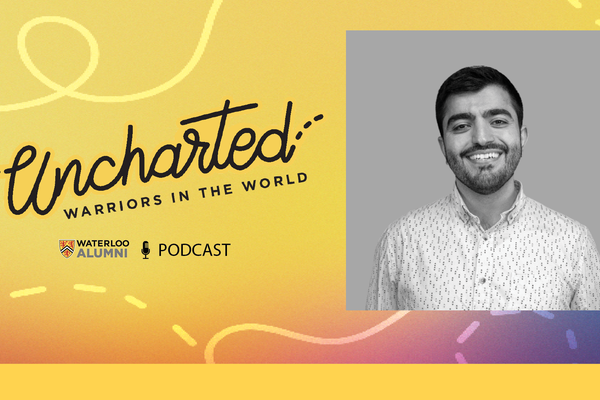 For some, it’s building a wind turbine to harness enough energy to race a car. For others, it’s creating a boat out of just cardboard and duct tape. For six-year-old Max Griffiths, there wasn’t just one highlight of his first camp experience in 2015, there were several, including designing a flute out of plastic pipes that actually plays music.
For some, it’s building a wind turbine to harness enough energy to race a car. For others, it’s creating a boat out of just cardboard and duct tape. For six-year-old Max Griffiths, there wasn’t just one highlight of his first camp experience in 2015, there were several, including designing a flute out of plastic pipes that actually plays music.
Celebrating its 25th anniversary this year, Engineering Science Quest, better known to most campers as ESQ, was founded in the fall of 1990 by a Waterloo science student and an engineering student as their fourth-year project.
It was Michelle Miller, a chemistry student at the time, who came up with the idea of starting the camp after attending a teaching pilot program at Queen’s University and noticing kids on the Kingston campus wearing engineering and science camp T-shirts. When Miller arrived back at Waterloo, she received approval from the dean of science to work on founding a similar camp as her fourth-year project. She was joined by an engineering student recommended by Bill Lennox, who was the dean of engineering in 1990.
“We weren’t prepared for the massive amount of work that needed to be done to get ESQ off the ground,” recalls Miller, now a secondary school teacher in Waterloo.
That work included everything from fundraising, to preparing budgets to setting up activities – all while going to school full-time. But once the two camps for kids in Grades 5 and 6 launched the following summer, Miller says it was all worthwhile for her and the three other counsellors, one of whom was Laura Matthews, an engineering student.
“We especially loved the aha moments the kids experienced,” she remembers.
More variety, greater diversity

At the end of Grade 9, Caitlin Idziak participated in Waterloo’s Catalyst Summer Leadership Program that engages high school students in science and engineering and includes a volunteer placement at ESQ. Since that summer, Idziak has worked as a high school leader in ESQ’s Banting camp for kids who are five and six years old.
“They all have their own interests,” says Idziak who enters Waterloo’s mechatronics engineering program in September. “I had a camper last year who after discovering I built robots as part of my high school’s FIRST Robotics team followed me around asking me questions. By the end of the week he was sold on becoming an engineer!”
Like Idziak, Eric Gemnay will also start Waterloo’s mechatronics engineering program in September. He’ll know his way around campus from participating in the Catalyst program and working at ESQ as a high school volunteer and leader for the summer, March break and after school programs.
“It was really cool to see kids starting to enjoy technology and engineering,” he says. “Towards the end of the nine weeks of the after school program kids were solving their own technology problems instead of asking us how to go about it.”

Scott Hicks’ parents both graduated as engineers from Waterloo, so it was likely that he would follow the same path. But the second year Waterloo mechanical engineering student says attending ESQ as a camper and then working as a high school leader made him realize he’d made the right decision.
He describes his first year as a leader of the Newton camp for kids ages 5 and 6 as an important learning experience.
“You had to find a way to communicate an idea that’s more complex like climate change and then bring it down to a level that campers could understand,” he says. “I’ve found that’s been really useful in the co-op workplace, especially when you’re trying to present concepts others may not fully understand.”
Stepping stone to startups
Ali Asaria worked as an ESQ high school intern as part of the Shad Valley program and later as a high school leader. He attributes his ESQ experience as the turning point for him when it came to deciding to come to Waterloo for computer engineering and for his career afterwards.
“ESQ was my first real job and I was given the tools and the trust to build things that I’d never been able to before,” he explains. “As well, being able to design the webpage for the program in the early days of the web was amazing.”
Since leaving Waterloo Engineering Asaria has started two successful tech companies: Well.ca and Tulip Retail.
“ESQ gave me the confidence to keep pursuing learning, engineering and computers which directly connect to my job now.”
Hands-on activities are ESQ’s hallmark

Mary Wells has the advantage of viewing ESQ through the lens of Waterloo Engineering’s associate dean of outreach who has overall responsibility for the program and also as a parent. Her son and two daughters have attended ESQ camps for a number of years.
“Seeing the camp through their eyes really showed me how valuable it is,” she says. “And to a certain degree, it made me believe more strongly in the program.”
Wells points out that the 2015 summer camp registration was filled by May this year, which is a direct reflection of the quality of the program and the desire of parents and their kids to have hands-on science and engineering activities.
The impact of the program was recognized with the 2013 Actua & GE Canada Award for Leadership and Innovation in science and technology education. The award recognizes ESQ’s dedication to high impact quality programs, ongoing leadership and supportive engagement of Canada’s most underserved youth.
In July 2015, ESQ was featured at the Pan Am games –the only initiative of its kind to be part of the Toronto event. Staff members were onsite for a day engaging children in engineering and science activities.
Looking to the future
Wells, current chair of the Ontario Network of Women in Engineering, says over the past few years staff members have worked at increasing the number of girls in ESQ programs, especially in the technology camps. Plans for the future include engaging more aboriginal youth, particularly girls, in ESQ.
When it comes to the success of ESQ Wells says it’s due to energetic and hard-working staff members, along with the commitment of the University to the program, a demonstration of our unique education. A large part of that commitment is the new home planned for the outreach department in Engineering 7.
Martin Scherer, manager of Waterloo Engineering’s outreach operations, adds that ESQ demystifies STEM, which stands for Science, Technology, Engineering and Mathematics, and perhaps inspire students to part of the future of engineering.
“It gets kids interested in STEM,” he says. “It also ignites their curiosity, their passion and their imaginations.”

 For some, it’s building a wind turbine to harness enough energy to race a car. For others, it’s creating a boat out of just cardboard and duct tape. For six-year-old Max Griffiths, there wasn’t just one highlight of his first camp experience in 2015, there were several, including designing a flute out of plastic pipes that actually plays music.
For some, it’s building a wind turbine to harness enough energy to race a car. For others, it’s creating a boat out of just cardboard and duct tape. For six-year-old Max Griffiths, there wasn’t just one highlight of his first camp experience in 2015, there were several, including designing a flute out of plastic pipes that actually plays music.









